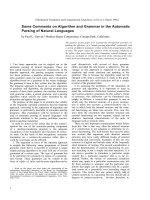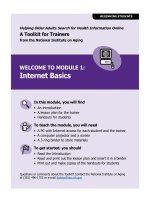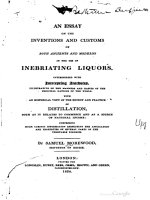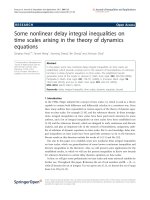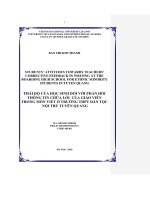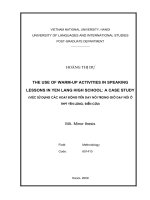Helping students use some tips while doing exercises about synonyms and antonyms in the national high school graduation exam
Bạn đang xem bản rút gọn của tài liệu. Xem và tải ngay bản đầy đủ của tài liệu tại đây (177.07 KB, 20 trang )
1. INTRODUCTION
1.1. Reason for choosing the research
Nowadays, in Vietnam, English is used more and more widely. It brings us
chances to keep up with the development of the modern age. Therefore, teaching
and learning English, especially at upper secondary schools play a very
important role.
In any languages, vocabulary is considered one of the most essential
elements of language. We can hardly use grammar appropriately if we do not
comprehend the meaning exactly. So poor knowledge of English vocabulary can
effect both the learning and teaching of English. Thus, it is necessary to apply
new methods of teaching and learning to improve the situation.
Synonyms and antonyms are categorized into English vocabulary.
According to the current national high school graduation exam questions,
multiple choice questions related to this section account for about 14% (about 7
sentences out of 50 multiple choice questions including questions about
synonyms and some antonyms in the closest and opposite meaning as well as in
the reading comprehension). Besides, understanding and using antonyms and
synonyms effectively can improve our writing skills and vocabulary knowledge.
However, this part of the knowledge has not been regularly taught and revised
like other vocabulary sections.
Therefore, in this study, I would like to give some suggestions for using
synonyms and antonyms effectively. The effort of this study is to try to give
some contribution to improve the quality of teaching English at high schools
by “Helping students use some tips while doing exercises about synonyms
and antonyms in the national high school graduation exam”.
1.2. Aims and objectives of the study
1.2.1. Aims
- To study the principles in teaching synonyms and antonyms.
- To investigate the causes of difficulties that teachers and students are
facing with teaching and learning synonyms and antonyms, so that teachers can
helpstudents to enhance their overall command of language in order to answer
synonyms and antonyms questions in the national high school graduation
exam.
- To designsome exercises about synonyms and antonyms from class 12
English book and introduce examples of synonyms and antonyms in the
multiple choice test recently.
- To increase the effectiveness in teaching and learning English and help
students to get good scores in the nationalhigh school graduation exam.
1.2.2. Objectives
The study is carried out to answer the following questions:
- What are synonyms and antonyms?
- Principles in teaching synonyms and antonyms
1
- Designing some exercises about synonyms and antonyms from class 12
English book
- Examples of synonyms and antonyms in the multiple choice test recently
1.3. Scope of the study
In teaching English vocabulary, synonyms and antonyms are large
sections. Within the scope of this study, I would like to focus on designing some
exercises about synonyms and antonyms from class 12 English book.
As time is limited, the survey is carried out on a small scale to 12 th form
students: 12A4, 12A7 in the school year 2018 – 2019.
1.4. Method of the study
In order to carry out this study, it is mainly based on the data and
information collected from surveys, observation and direct interviews from my
colleagues. It is also based on a number of reference books about the use of
synonyms and antonyms in teaching English. Furthermore, my actual teaching at
Dang Thai Mai high school provides the great practical contribution to the study.
1.5. New points of the study
Synonyms and antonyms are important parts of teaching and learning
English vocabulary. Many experience initiatives of the authors have mentioned
effective vocabulary teaching methods, but no author has ever studied on
synonyms and antonyms in detail. Especially, in this study, I design some
exercises about synonyms and antonyms from class 12 English book and
introduce examples of synonyms and antonyms in the multiple choice test
recently as tips for students while doing exercises about synonyms and
antonyms in the national high school graduation exam.
2. CONTENTS
2
2.1.Theoretical background
2.1.1. Definition of synonyms
According to language dictionaries, synonyms are words that have similar
meanings. Synonyms are divided into two categories: complete synonyms and
incomplete synonyms. The first is the words with the same meaning, used
equally and can be substituted for each other in most cases. The second type are
words that mean the same thing but still differ somewhat in expressive nuances
(expressing emotions, attitudes ...) or ways of acting. When using these words,
we must consider the options reasonably.[1]
2.1.2.Definition of antonyms
Antonyms are contradictory words. Similar to synonyms, we also have two
types of antonyms that are completely antonyms and incompletely ones .
From the above concepts, there are some points we need to note as follows:
Whether the words are considered to be synonymous or completely opposite,
there are differences between them and cannot be used in lieu of each other in
case. Therefore, in addition to teaching and learning the meaning of words, we
need to pay attention to the context in which synonyms or antonyms can be
used.[1]
2.1.3. Principles in teaching synonyms and antonyms
Due to the time constraints, I only included in this section some principles
of teaching synonyms and antonyms that I have applied and found them
effective.
The first principle: All teachers' instructions must be detailed, clear and
specific. If the instructions are not specific and generic, students will not know
how to perform their tasks and the task is easy to fail. The most important part of
this section is to guide students to find resources to look up synonyms and
antonyms and quick and effective ways to look up.
The main source is English-English dictionaries and dictionaries specializing in
synonyms and antonyms. Students can look up dictionaries with printouts or
dictionaries on the internet. The quick way to look up for compound words not
in the dictionary is to look up from the root, then determine the definition of the
same word prefix, its suffix.[2]
The second principle: Get students centered, boldly assign tasks to groups
of students to learn about synonyms and antonyms in specific lessons. This
principle helps students take the initiative, actively participate in the lesson and
help develop their teamwork skills and presentation skills.
Assigning the study of synonyms and antonyms in a certain lesson to students
causes students to brainstorm, actively embark on a task and thereby actively
memorize vocabulary. The work assigned to the student group will ease the
pressure. In addition, students can also support and help each other to complete
the task. The presentation part can be spoken in Vietnamese or English,
depending on the choice of the groups, which helps develop the presentation
skills.[2]
3
The third principle: Focus on monitoring the progress of groups, compare
and evaluate results
Monitoring the progress of each group will help teachers evaluate and comment
more accurately on the results of each group. In addition, teachers can promptly
provide appropriate help for disadvantaged groups.
Comparing, comparing and evaluating the results of each group of students or
even each student in the group will create more motivation for them to try to
complete their tasks.[2]
The fourth principle: Teachers play a major role in synthesizing,
modifying, and supplementing the results of groups.
After the results of the groups have been evaluated, they need to be fully
integrated, edited and supplemented before the teacher returns the final product
to the students. This is the period when teachers play a key role to ensure that
they provide adequate and accurate knowledge to their students.[2]
The fifth principle: Regular checks, comments and evaluations that each
individual student uses the knowledge of synonyms, in contrast, learns to speak
and write English.
This is the principle of "learning with practice", to encourage students to use the
knowledge they already have in speaking and writing production skills. This
must be done regularly to form a habit of using a student's foreign language.[2]
2.2. The status of problem
2.2.1. Students, their background and learning conditions
The informants for the study consists of 82 students in the twelveth form
(age 17-18) from two classes 12A4 and 12A7, and 8 teachers of English at Dang
Thai Mai High School.
The first reason for my selection is that my selected participants are
accessible. All these students have learnt English for more than four years at
secondary schools as they started to learn English when they were in grade 6.
Most of them have got familiar with teaching and learning methods at middle
level.
The second reason is our awareness of the completeness and reliability of
the data collected. We must be well-informed about the real situation of teaching
and adapting English vocabulary at our school.
In addition, the main method used was the VocabularyTranslation Method.
The students may be good at learning by heart English vocabulary but they can
not use them effectively in the multiple choice tests.
2.2.2. Teachers and their working condition
Most teachers in the survey are female aged from twenty- six to forty. They
have been teaching English for at least three years. They usually teach classes
with 39 to 45 students and each of them is in charge of three or four classes.
Meanwhile, teaching facilities are poor and backward. Therefore, the main
teaching material of the teachers is the textbook for students. Teachers
4
sometimes have difficulties in designing exercises about synonyms and
antonyms from English book.
It can be found that the teachers have to work hard but the results seem
not to be satisfactory. This is a great problem.
2.2.3. Analysis of the data
There is a quick questionnaire designed for students from two classes 12A4
and 12A7 to gather necessary information about using synonyms and antonyms
to do exercises. Students are encouraged to express their own opinions about
their ability to apply synonyms and antonyms in the multiple choice tests.
This data is collected from students:
Student
s total
82
Know how to do
exercises about
synonyms and
antonyms
30 (36,6%)
Have difficulties in
doing exercises
about synonyms
and antonyms
22 (26,8%)
Impossible to
distinguish
synonyms from
antonyms
30 (36,6%)
Table 1: Analysis of the data collected from students before applying
the research
It can be seen from the table that only 36,6% know how to do exercises
about synonyms and antonyms to practise fluently whereas 26,8% find it
difficult. 36,6% say they are impossible to distinguish synonyms from
antonyms.
The following data is the result of the multiple choice test in the first
semester before applying the research:
Class
12A4
12A7
Number of
students
39
43
Excellentgood (%)
35
30
Average (%)
40
50
Weak (bad)
(%)
25
20
Table 2: Analysis of the data collected from the result of the multiple
choice test in the first semester before applying the research:
These figures show that it is really necessary to change the way to teach
new vocabulary so that students are able to practise effectively.
2.3. Designing some exercises about synonyms and antonyms from class 12
English book
The design of the exercises is a teacher's duty to do after each knowledge
section is taught in the classroom. Although it is a common task, there are some
things we need to pay attention to. Firstly, the design of the exercise must ensure
learning what to do and practice it. This is to ensure the effectiveness of the
exercises we create. Secondly, the types of exercises that are designed must be
diverse and rich with many levels from easy to difficult. This helps to
accommodate different student groups and inspires students.
2.3.1. Matching exercises
5
This is an easy exercise. Students only need to remember the knowledge
they have learned to be able to complete this part.
Unit 1: Home Life (Page 12) [3]
Exercise 1. Match the word in column A with its synonyms in colum B
Column A
1. brothers/sisters
2. base
3. wash the clothes
4. rule
5. topic
6. wait
7. information
8. note down
9. collect
10. annoy
Answer key:
Exercise 1:
1. i
2. f
6. j
7. e
Column B
a. write down
b. theme
c. regulation
d. irritate
e. data
f. foundation
g. gather
h. do the laundry
i. siblings
j. hold on/ hang on
3. h
8. a
4. c
9. g
5. b
10. d
Exercise 2. Match the word in column A with its antonyms in colum B
Column A
Column B
1. supportive
a. neglect
2. willing
b. depressed
3. obedient
c. ban
4. take care of
d. critical
5. happy
e. indifferent
6. allow
f. at a loose end
7. hard-working
g. costly
8. busy
h. reluctant
9. cheap
i. naughty
10. interested
j. idle
Answer key:
Exercise 2:
1. d
2. h
3. i
4. a
5. b
6. e
7. c
8. j
9. f
10. g
Unit 2: Cultural Diversity (Page 20) [3]
6
Exercise 3. Match the word in column A with its synonyms in colum B
Column A
Column B
1. diversity
a. reply
2. flat
b. home for the aged
3. job
c. present
4. respond
d. party
5. confide in
e. variety
6. careful
f. commence
7. start
g. apartment
8. gift
h. share one’s thoughts
9. nursing home
i. occupation
10. banquet
k. thorough
Answer key:
Exercise 3:
1. e
2. g
3. i
4. a
5. h
6. k
7. f
8. c
9. b
10. d
Exercise 4. Match the word in column A with its antonyms in colum B
Column A
Column B
1. difference
a. minority
2. follow
b. temporary
3. majority
c. pessimistic
4. reject
d. be under no obligation
5. modern
e. tell the truth
6. permanent
f. similarity
7. optimistic
g. deteriorate
8. be obliged
h. accept
9. lie
i. traditional
10. better
k. precede
Answer key:
Exercise 4:
1.f
6.b
2. k
7. c
3. a
8.d
4. h
9. e
5. i
10.g
Unit 3: Ways of socializing (Page 30) [3]
7
Exercise 5. Match the word in column A with its synonyms in colum B
Column A
Column B
1. suitable
2. obvious
3. choice
4. polite
5. buy
6. stick to
7. kind-hearted
8. interesting
9. serious
10. color
Answer key:
Exercise 5:
1. e
6. i
a. apparent
b. good-natured
c. severe
d. purchase
e. appropriate
f. gripping
g. hue
h. option
i. be loyal to
k. courteous
2. a
7. b
3. h
8. f
4. k
9. c
5. d
10. g
Exercise 6. Match the word in column A with its antonyms in colum B
Column A
Column B
1. get off
a. take a call
2. modern
b. prohibitten
3. leave a message
c. politeness
4. make a call
d. maximum
5. acceptable
e. get on
6. discourtesy
f. body language
7. minimum
g. reveal
8. verbal language
h. take a message
9. conceal
i. failure
10. success
k. old-fashioned
Answer key:
Exercise 6:
1.e
6. c
2. k
7. d
3. h
8.f
4. a
9. g
5. b
10. I
8
2.3.2. Odd one out exercises
In this form, students must recognize a word that does not have the same
meaning or antonym to the remaining words. To do this exercise, students must
remember groups of synonyms or antonyms.
Unit 1: Home Life (Page 12) [3]
Exercise 1: Find one word that is different in meaning from the others
1. housework, household chores, domestic tasks, household duties, daily tasks
2. help, give a hand, owe, assist, aid
3. try, eliminate, endeavor, strive, make an effort, attempt
4. build, construct, put up, ruin, erect
5. child, kid, infant, gentleman
6. place, space, site, spot
7. sometimes, occasionally, frequently, from time to time
8. important, creative, vital, crucial, significant
9. hobby, interest, perseverance, taste
10. task, complement, duty, mission
Answer key:
Exercise 1:
1. daily tasks
6. space
2. owe
7. frequently
3. eliminate
8. creative
4. ruin
9. perserverance
5. gentleman
10. complement
Unit 2: Cultural Diversity (Page 20) [3]
Exercise 2: Find one word that is different in meaning from the others
1. idea, view, point of view, opinion, objection
2. love sb, fall in love with sb, interfere with sb, fall with sb, take to sb
3. choose, select, opt, pick out, reckon, decide on, agree on
4. conduct a survey, make a survey, carry out a survey, cancel a survey
5. main, key, primary, vicious, major, core
6. famous, well-known, renowned, excessive, celebrated, notable, pretigious
7. take part in, participate in, result in, engage in, join, attend
8. however, nevertheless, on the contrary, additionally, by contrast,
controversially
9. rich, wealthy, middle-class, well-off, affluent
10. dangerous, disastrious, hazardous, perilous, risky
9
Answer key:
Exercise 2:
1. objection
2. interfere with sb
3. reckon
4. cancel a survey
5. vicious
6. excessive
7. result in
8. additionally
9. middle-class
10. disastrious
Unit 3: Ways of socializing (Page 30) [3]
Exercise 3: Find one word that is different in meaning from the others
1. terrible, awful, dreadful, accessible
2. problem, difficulty, trouble, amenity, obstacle
3. argument, appointment, row, quarrel
4. beginning, provision, start, rudiment
5. hate, detest, spark, loathe, dislike
6. friend, colleague, mate, pal, company
7. big, huge, giant, skeptical, mighty, gigantic, bulky
8. like, enjoy, love, fancy, adore, detect
9. mistake, error, fault, apology
10. attack sb’s attention, get sb’s attention, distract sb’s attention, catch sb’s
attention
Answer key:
Exercise 3:
1. accessible
6. colleague
2. amenity
7. skeptical
3. appointment
8. detect
4. provision
9. apology
5. spark
10. distract sb’s attention
2.3.3. Multiple choice exercises
This exercise requires students to identify synonyms or antonyms in
some options
Exercise: Choose the best word/phrase that is CLOSEST in meaning to the
underlined part in each of the following questions.
1. Women whose husbands do not contribute to the domestic chores are more
vulnerable to illness.
A. able to be well protected
B. able to be easily hurt
C. able to be well known
D. able to be equally treated
2. In many cultures, the mother is usually the homemaker while the father is the
breadwinner.
A. the family member who is willing to share the domestic chores
B. the family member who likes bread
C. the family member who is responsible for childcare
10
D. the family member who earns money to support the family
3. We enjoy spending time together in the evening when the family members
assemble in the living room after a day of working hard.
A. get together
B. watch TV
C. chat
D. tell jokes
4. She got up late and rushed to the bus stop.
A. came into
B. went leisurely C. went quickly
D. dropped by
5. It will take more or less a month to prepare for the wedding.
A. approximately B. generally
C. frankly
D.appreciatively
6. This is the instance where big, obvious non-verbal signals are appropriate.
A. situation.
B. attention
C. place
D. matter
7. When you are in a restaurant, you can raise your hand slightly to show that
you need assistance.
A. bill
B. menu
C. help
D. food
8. Peter: In my opinion, old aged parents should lead independent lives in
nursing homes
Nam: I disagree with you. Children should take after their elderly parents.
A. You can say that again
B. I can’t agree with you any more
C. There’s no doubt about that
D. That’s not a good idea.
9. Although I live in London for one year, I’m not used to driving on the left.
A. accustomed
B. familiar
C. looking forward D. supportive
10. Quan Ho singing, a traditional kind of music, originated in Bac Ninh
Province in the 13th century.
A. launched
B. took its origin
C. initiated
D. appeared
Answer key:
1. B
6. A
2. D
7. C
3. A
8. D
4. C
9. A
5. A
10. B
2.3.4. Replacement exercises
Doing this exercise, students must remember not only the meaning but also
the way to write synonyms and antonyms and rewrite these words.
Exercise: Replace the underlined word or phrases with its synonyms
1. Our parents join hands to give us a nice house and a happy home.
2. Whenever we hurt someone’s feeling, we apologize.
3. Members of my family share the household chores.
4. Andrea can’t wait for her flight.
5. In an extended family, three or even four generations live in one home.
6. She complimented me on my new shirt.
7. Members of our family have very close relationships with each other.
8. Could you please look after the baby while I’m away?
9. My parents seldom allow telling lies in my family.
10. A survey was made to determine their attitudes toward love and marriage.
11
Answer key:
1. work together
6. paid me a nice compliment
2. made an apology
7. get on very well
3. do our share of
8. keep an eye on
4. look forward to
9. rarely/lying
5. joint family/ under the same roof
10. find out
2.3.5. Paraphrasing exercises
This is a synthetic exercise, students have to rewrite sentences using
synonyms and similar structures.
Exercise: Paraphrase the following sentences
1. I’m 28 years old.
2. She is a doctor in a local hospital.
3. There are four people in my family.
4. I help my mother with some housework such as cleaning the house and taking
out the garbage.
5. It is undeniable that families play an important part in our lives.
6. Not only my dad but also my mum works and support the family.
7. The bride and the groom thanked all the guests for their presence best wishes.
8. To attract someone’s attention, we can use either verbal or non-verbal forms
of communication.
9. In America, it’s impolite to ask questions about age, marriage and income.
10. You had better not take calls during meal time.
Answer key:
1. I’m an 28-year-old girl
I’m in my late twenties
2. She works as physician in a local hospital
3. I come from a family of four people
I was born into a family of four people
4. I give my mum a hand with some domestic tasks like tidying up the house and
emptying the rubbish.
5. Nobody can deny the importance of families in our lives
6. Both my parents go out to work and provide for the family
7. The couple expressed their special gratitude to all the participants for their
presence and blessings.
8. In order to draw other people’s attention, either verbal or non-verbal forms of
communication can be used.
9. It’s considered discourteous to ask Americans questions about age, marriage
and income.
10. You are advised not to take calls when having meals.
2.4. Examples of synonyms and antonyms in the multiple choice test
recently
Example 1: The national high school graduation examin 2015 – No 194. [4]
12
Mark the letter A, B, C or D on your answer sheet to indicate the word(s)
CLOSEST in meaning to the underlined word(s) in each of the following
questions.
Question 25: When Susan invited us to dinner, she really showed off her
culinary talents. She prepared a feast – a huge selection of dishes that were
simply mouth - watering.
A. having to do with food and cooking
B. involving hygienic conditions and diseases
C. relating to medical knowledge
D. concerning nutrition and health
Question 26: Suddenly, it began to rain heavily, so all the summer hikers got
drenched all over.
A. cleansed
B. completely wet C. very tired
D. refreshed
Question 27: “It’s no use talking to me about metaphysics. It’s a closed book to
me.”
A. a subject that I don’t understand
B. a theme that I like to discuss
C. a book that is never opened
D. an object that I really love
Mark the letter A, B, C, or D on your answer sheet to indicate the word(s)
OPPOSITE in meaning to the underlined word(s) in each of the following
questions.
Question 43: "Don't be such a pessimist. I'm sure you'll soon get over it. Cheer
up!"
A. activist
B. hobbyist
C. optimist
D. feminist
Question 44: "Be quick! We must speed up if we don’t want to miss the flight "
A. turn down
B. look up
C. slow down
D. put forward
Answer key:
25. A
26. B
27. A
43. C
44. C
Example 2: The national high school graduation exam in 2016 – No 168. [5]
Mark the letter A, B, C, or D on your answer sheet to indicate the word(s)
CLOSEST in meaning to the underlined word(s) in each of the following
questions.
Question 25: Not until all their demands had been turned down did the workers
decide to go on strike for more welfare.
A. rejected
B. sacked
C. reviewed
D. deleted
Question 26: Environmentalists appeal to the government to enact laws to stop
factories from discharging toxic chemicals into the sea.
A. releasing
B. producing
C. obtaining
D. dismissing
Question 27: The overall aim of the book is to help bridge the gap between
theory and practice, particularly in language teaching.
A. increase the understanding
B. reduce the differences
C. minimise the limitations
D. construct a bridge
13
Mark the letter A, B, C, or D on your answer sheet to indicate the word(s)
OPPOSITE in meaning to the underlined word(s) in each of the following
questions.
Question 43: It is widely known that the excessive use of pesticides is
producing a detrimental effect on the local groundwater.
A. useless
B. harmless
C. damaging
D. fundamental
Question 44: His dreamlike villa in the new residential quarter is the envy of his
friends.
A. something that everybody looks for
B. something that everybody dreams of
C. something that nobody wants
D. something that nobody can afford
Answer key:
25. A
26. A
27. B
43. B
44. C
Example 3: The national high school graduation exam in 2017 – No 402. [6]
Mark the letter A, B, C, or D on your answer sheet to indicate the word(s)
OPPOSITE in meaning to the underlined word(s) in each of the following
questions.
Question 19: Today students are under a lot of pressure due to the high
expectations from their parents and teachers.
A. nervousness
B. emotion
C. stress
D. relaxation
Question 20: Don't tell Jane anything about the surprise party for Jack. She has
got a big mouth.
A. can't eat a lot
B. hates parties
C. talks too much D. can keep secrets
Mark the letter A, B, C, or D on your answer sheet to indicate the word(s)
CLOSEST in meaning to the underlined word(s) in each of the following
questions.
Question 21: The place has rapidly evolved from a small fishing community
into a thriving tourist resort.
A. developed
B. generated
C. created
D. increased
Question 22: Many people left early because the film was uninteresting.
A. exciting
B. informative
C. attractive
D. boring
Read the following passage and mark the letter A, B, C, or D on your answer sheet
to indicate the correct answer to each of the questions from 35 to 42.
The oceans are so vast and deep that until fairly recently, it was widely
assumed that no matter how much trash and chemicals humans dumped into
them, the effects would be negligible. Proponents of dumping in the oceans
even had a catchphrase: "The solution to pollution is dilution."
Today, we need look no further than the New Jersey-size dead zone that
forms each summer in the Mississippi River Delta, or the thousand-milewide swath of decomposing plastic in the northern Pacific Ocean to see that
14
this "dilution" policy has helped place a once flourishing ocean ecosystem on
the brink of collapse.
There is evidence that the oceans have suffered at the hands of mankind
for millennia. But recent studies show that degradation, particularly of shoreline
areas, has accelerated dramatically in the past three centuries as industrial
discharge and run-off from farms and coastal cities have increased.
Pollution is the introduction of harmful contaminants that are outside the
norm for a given ecosystem. Common man-made pollutants reaching the
oceans include pesticides, herbicides, chemical fertilizers, detergents, oil,
sewage, plastics, and other solids. Many of these pollutants collect at the
ocean's depths, where they are consumed by small marine organisms and
introduced into the global food chain.
Many ocean pollutants are released into the environment far
upstream from coastlines. Nitrogen-rich fertilizers applied by farmers inland,
for example, end up in local streams, rivers, and groundwater and are eventually
deposited in estuaries, bays, and deltas. These excess nutrients can spawn
massive blooms of algae that rob the water of oxygen, leaving areas where little
or no marine
life can exist.
Solid wastes like bags, foam, and other items dumped into the oceans
from land or by ships at sea are frequently consumed, with often fatal
effects, by marine mammals, fish, and birds that mistake them for food.
Discarded fishing nets drift for many years, ensnaring fish and mammals. In
certain regions, ocean currents corral trillions of decomposing plastic items and
other trash into gigantic, swirling garbage patches. One in the North Pacific,
known as the Pacific Trash Vortex, is estimated to be the size of Texas.
Pollution is not always physical. In large bodies of water, sound waves
can carry undiminished for miles. The increased presence of loud or persistent
sounds from ships, sonar devices, oil rigs, and even from natural sources like
earthquakes can disrupt the migration, communication, and reproduction
patterns of many marine animals, particularly aquatic mammals like whales and
dolphins.
(Source: )
Question 36. The word "negligible" in paragraph 1 is closest in meaning to ______
A. serious
B. insignificant
C. unpredictable
D. positive
Question 37. It can be inferred from paragraph 2 that the "dilution" policy is
related to ______.
A. dealing with the problems of water pollution
B. helping the ecosystem of the oceans flourish
C. neglecting the effects of dumping trash into the oceans
D. treating harmful materials in the oceans properly
Question 39. The word "spawn" in paragraph 5 can be best replaced by
______.
15
A. appear
Answer key:
19. D
B. prevent
20. D
21. A
C. produce
22. D
36. B
D. limit
37. C
39. C
Example 4:The national high school graduation exam in 2018 – No 401. [7]
Mark the letter A, B, C, or D on your answer sheet to indicate the word(s)
CLOSEST in meaning to the underlined word(s) in each of the following
questions.
Question 3: Thanks to highly sophisticated technology, scientists have made
many important discoveries in different fields.
A. accessible
B. confusing
C. effective
D. advanced
Question 4: It is firmly believed that books are a primary means for
disseminating knowledge and information
A. classifying
B. distributing
C. adopting
D. inventing
Mark the letter A, B, C, or D on your answer sheet to indicate the word(s)
OPPOSITE in meaning to the underlined word(s) in each of the following
questions.
Question 5: With price increases on most necessities, many people have to
tighten their belt for fear of getting into financial difficulties.
A. dress in loose clothes
B. spend money freely
C. save on daily expenses
D. put on tighter belts
Question 6: Today the number of start-ups in Vietnam is mounting as the
government has created favourable conditions for them to develop their
business.
A. peaking
B. varying
C. decreasing
D. rising
Answer key:
3. D
4. B
5. B
6. C
2.5. Result after applying the research in teaching
From this research study, it can be concluded that teachers and 12 th form
students at Dang Thai Mai high school are aware of the role of synonyms and
antonyms in teaching and learning vocabulary.
After applying the research, students have chance to express their own
opinions about their ability to apply synonyms and antonyms to solve multiple
questions.
This data is collected from students:
Know how to do
Have difficulties in
Impossible to
Students
exercises about
doing exercises
distinguish
total
synonyms and
about synonyms and
synonyms from
antonyms
antonyms
antonyms
82
60(73,2%)
17(18,7%)
5 (8,1%)
16
Table 3: Analysis of the data collected from students after applying the
research
These figures show that it is really necessary to have a change in applying
some tips while dong exercises about synonyms and antonyms
The following data is the result of from the result of the multiple choice
test in the first semester after applying the research
Class
10A7
10A9
Number of
students
39
43
Excellentgood (%)
45
40
Average (%)
45
52
Weak (bad)
(%)
10
8
Table 4: Analysis of the data collected from the result of the multiple
choice test in the second semester after applying the research
17
3. CONCLUSION AND PROPOSAL
3.1. Conclusion
From this research study, it can be concluded that teachers and 12 th form
students at Dang Thai Mai high school are aware of the role of using synonyms
and antonyms in teaching and learning vocabulary. It is also seen from above
that the students have different tips to do exercises about synonyms and
antonyms in the national high school graduation exam. The findings of this
research also reveal that it is essential to design some exercises about synonyms
and antonyms from twelveth English book for students to practise regularly.
Nevertheless, because of limited time, knowledge, teaching experience,
mistakes committed during the process of the study are unavoidable, I would be
grateful to receive any comments on my study. All comments and suggestions
from other teachers and colleagues are highly appreciated.
3.2. Proposal
Due to the small scope of the study and the limitations of the knowledge
and experience, this study can not cover all aspects of the matter. In this study, I
just focus on helping students use some tips while doing exercises about
synonyms and antonyms. As a consequence, I can have the following study
orientations:
- Other suggested ways to motivate students in practicing synonyms and
antonyms multiple choice questions.
- Besides the research in using some tips while doing exercises about
synonyms and antonyms, it can be applied for other exercises in the national
high school graduation exam.
In conclusion, I hope that further studies will be carried out on other
aspects of teaching English vocabulary in order to improve the quality of
teaching and learning English at high schools.
I sincerely thank!
The confirmation of the headmaster
Thanh Hoa, May 20th 2019
I assure this is my own experience
initiative, not copying the contents of
otherpeople.
The writer
Dao Thi Hong
18
REFERENCE BOOKS
[1]. Ho Ngoc Trung, Lectures on discourse analysis, HaNoi Open University.
[2]. Lewis, M & Hill, J (1998), Practical Techniques for Language
Teaching.England: Language Teaching Publications.
[3]. Hoang Van Van (2011), English 12, Viet Nam: Education publisher.
[4]. />[5]. />[6]. />[7]. />
19
LIST OF EXPERIENCE INITIATIVE WAS AWARDED
Number
1
Name of experience initiative
Using visual aids to motivate the
10th form students in practising new
grammar structures.
Ranked
School year
C
2016 – 2017
20

